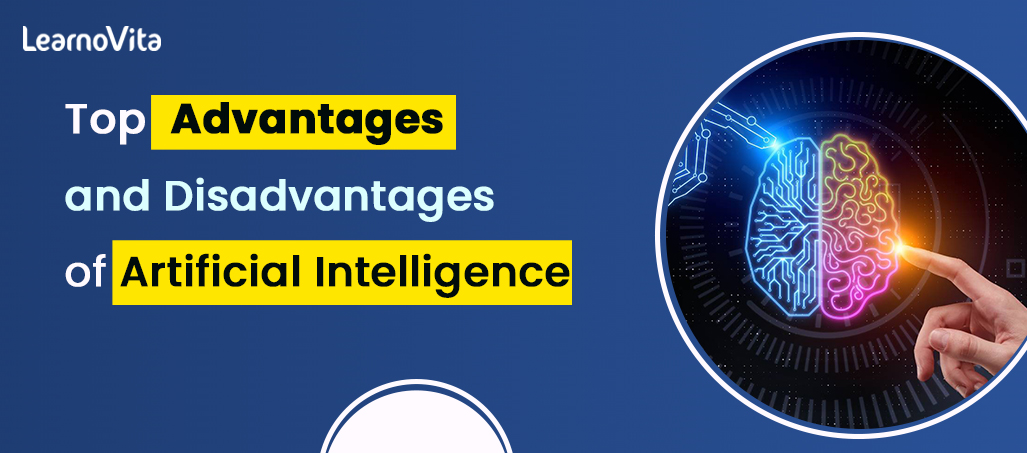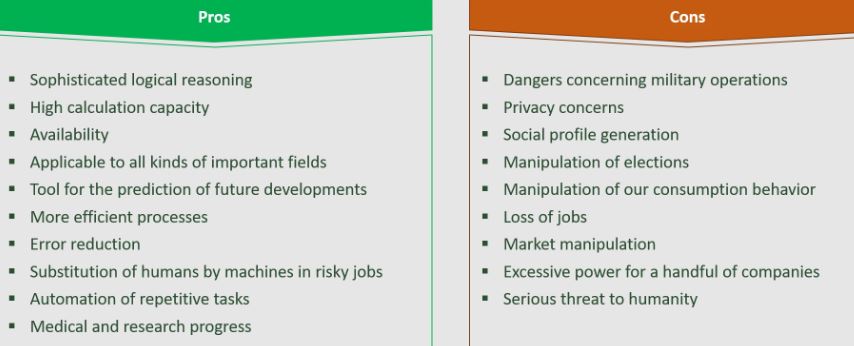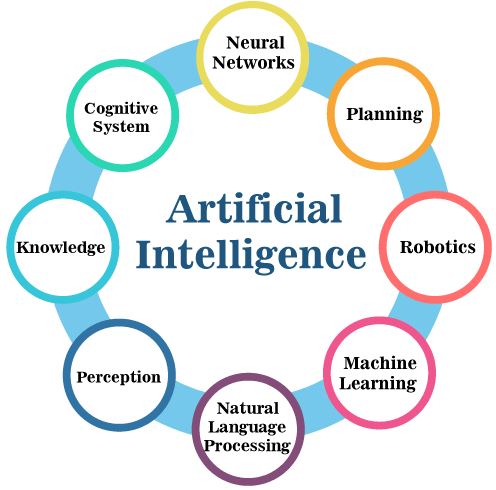
Advantages and Disadvantages of Artificial Intelligence
Last updated on 27th Oct 2022, Artciles, Blog
- In this article you will learn:
- 1.Artificial Intelligence.
- 2.The benefits of artificial intelligence.
- 3.Positive aspects of artificial intelligence.
- 4.Drawbacks of artificial intelligence.
- 5.Why study AI safety?
- 6.How is AI employed?
- 7. classes of Artificial.
- 8.Conclusion.
Artificial Intelligenc:
Before discussing the benefits and drawbacks of artificial intelligence, we must first define the term. AI provides a computer program with the capacity to think and learn independently. It is the simulation of human intelligence (hence, artificial intelligence) in machines to perform tasks for which we would ordinarily depend on humans. On the basis of their capabilities, there are three primary types of AI: weak AI, strong AI, and super AI.
Weak AI – Concentrates on a single task and cannot exceed its limitations (common in our daily lives)
Strong AI – Capable of understanding and learning any intellectual task a human can (researchers are striving to reach strong AI)
Super Artificial Intelligence – Exceeds human intelligence and can perform any task better than a person (still a concept)
The benefits of artificial intelligence:
A program with artificial intelligence is capable of learning and reasoning. It is possible to classify anything as artificial intelligence if it consists of a computer program performing a task that we would normally attribute to a human. Let’s begin with artificial intelligence’s benefits.
Positive aspects of artificial intelligence:
1. Minimization of Human Error:
One of the greatest benefits of artificial intelligence is its ability to reduce errors and improve precision and accuracy. The decisions made by AI at every stage are determined by previously gathered data and a specific set of algorithms. When properly programmed, these errors can be eliminated.
2. Zero Risks:
Humans can avoid many risks by delegating these tasks to AI robots. This is a significant advantage of AI. No matter if they are used to defuse a bomb, go into space, or explore the depths of the ocean, machines with metal bodies are strong and can handle hostile environments. In addition, they are capable of providing accurate work with increased responsibility and do not tire easily.
3. 24×7 Availability:
Several studies show that people are only useful for three to four hours a day. Humans require breaks and time off to maintain a healthy work-life balance. However, AI can work continuously without taking breaks. They think much faster than humans and accurately complete multiple tasks simultaneously. With the help of AI algorithms, they can even perform tedious, repetitive tasks with ease.
4. Digital Assistance:
Some of the most technologically advanced businesses use digital assistants to talk to their customers instead of people. Content requested by visitors is often delivered by digital assistants used by numerous websites. We can have a conversation with them about our search. Some chatbots are made so that it’s hard to tell the difference between a real person and a chatbot.We all know that businesses have customer service departments whose job is to answer questions and deal with problems. Using AI, businesses can create chatbots and voice bots that can answer all of their customers’ questions.Related Reading: Leading Trends in Digital Marketing.
5. Modern Innovations:
AI is the driving force behind many innovations that will help people solve the vast majority of hard problems in almost every field.For example, recent improvements in AI-based technologies have made it possible for doctors to find breast cancer in women at an earlier stage.
6. Objective Decisions:
We are emotional creatures, whether we like it or not. In contrast, artificial intelligence is emotionless, highly pragmatic, and rational in its approach. A significant advantage of artificial intelligence is its lack of bias, which enables more precise decision-making.
7. Carry Out Repetitive Tasks:
As part of our daily work, we will do a lot of tasks that we do over and over again, like looking for mistakes in documents and sending thank-you notes. We may use artificial intelligence to automate these mundane tasks and even eliminate “boring” tasks for humans, allowing them to focus on more creative endeavours.Multiple document checks to obtain a loan are common in banks, which is a time-consuming process for the bank owner. Using AI Cognitive Automation, the owner can expedite the document verification process to the benefit of both clients and the owner.
8. Everyday Applications:
Today, mobile devices and the internet are indispensable to our daily lives. We use numerous apps, such as Google Maps, Alexa, Siri, Cortana on Windows, OK Google, for taking selfies, making phone calls, responding to emails, etc. Using various AI-based techniques, we can also predict the weather for today and the coming days.When planning a trip approximately 20 years ago, you must have asked someone who had already been there for directions. You only need to ask Google where Bangalore is now. On a Google map, the optimal route between you and Bangalore will be displayed, along with Bangalore’s location.
9. AI in Dangerous Situations:
This is one of the primary benefits of artificial intelligence. By developing an AI robot that can perform dangerous tasks on our behalf, we can circumvent many of the perilous limitations humans face. It can be utilized effectively in any type of natural or man-made disaster, including a mission to Mars, the detonation of a bomb, the exploration of the deepest parts of the ocean, and the extraction of coal and oil.For example, the explosion at the Ukrainian nuclear power plant at Chernobyl. As anyone who approached the core would have perished within minutes, there were no AI-powered robots available at the time to assist us in mitigating the effects of radiation by controlling the fire in its early stages.

Drawbacks of artificial intelligence:
1. High Prices:
It is no small feat to create a machine that can simulate human intelligence. It requires a great deal of time and resources and can be extremely expensive. AI must use the latest hardware and software to stay up-to-date and meet the latest needs, which makes it quite expensive.
2. no originality:
A major disadvantage of artificial intelligence is that it cannot learn to think creatively. AI can learn over time with the help of data it has been given and what it has learned in the past, but it can’t be creative. A classic example is the bot Quill, which can generate earnings reports for Forbes. These reports only include information and facts already supplied to the bot. Even though it’s cool that a bot can write an article on its own, this one doesn’t have the human touch of other Forbes articles.
3. Unemployment:
A robot is one way that artificial intelligence is taking away jobs and (in some cases) making unemployment worse. Some people say that because chatbots and robots are replacing humans, unemployment is always a possibility.In the manufacturing sector of some technologically advanced countries, such as Japan, robots are often used instead of people. This isn’t always true, though, because automation can create more jobs for people while also replacing people to improve efficiency.
4. Make Humans Lazy:
The majority of mundane and repetitive tasks are automated by AI applications. Since we no longer need to memorize information or solve puzzles to do our jobs, we use our brains less and less. This reliance on AI could pose problems for future generations.
5. Unethical:
Ethics and morality are important parts of being human, but they can be hard to program into artificial intelligence. People are worried that AI will one day grow out of control and wipe out all humans because it is improving so quickly. This juncture is known as the “AI singularity.
6. Unemotional:
We have been taught since early childhood that neither computers nor other machines have feelings. Humans operate as a team, and team management is crucial for achieving objectives. But it can’t be denied that robots are more efficient than people. However, computers can’t replace human connections, which are what make teams work.
7. No Improvement:
Artificial intelligence can’t be made by humans because it is based on facts and experiences that have already been stored. AI is good at doing the same thing over and over, but if we want changes or improvements, we have to change the codes by hand. AI can’t be used and accessed in the same way as human intelligence, but it can store an infinite amount of data.Machines can only do the tasks they were built or programmed to do. If they are asked to do something else, they often fail or give meaningless results, which can have very bad effects. Therefore, we cannot create anything conventional.
Why study AI safety?
In the short term, the goal of limiting AI’s negative effects on society drives research in a wide range of fields, from economics and law to technological issues like verification, validity, security, and control. If your automobile, airplane, pacemaker, automated trading system, or electricity grid is controlled by an AI system, it is far more important that it perform as intended than if it were a computer that crashed or was hacked. Another pressing issue is preventing a lethal arms race with lethal autonomous weapons.
What will happen if the push for strong AI is successful and an AI system outperforms humans in all cognitive tasks? This is a major worry for the years to come. In 1965, I.J. Good pointed out that making better AI systems is a cognitive task in and of itself. Theoretically, a system like this could improve itself over and over again, leading to an intelligence explosion that would be far smarter than humans. This super intelligence could help end war, disease, and hunger by coming up with new, innovative technologies. This makes the creation of powerful AI the most important event in human history. But some experts worry that it could be the last if we can’t get the AI’s goals to match ours before it becomes super intelligent.
Some people say that super intelligent AI will never be made, while others say that it would always be a good thing to make it. We at FLI are aware of both of these possibilities, but we are also aware that an AI system could cause a lot of damage, either on purpose or by accident. We believe that the research conducted today will aid us in better preparing for and avoiding such potential negative consequences in the future, allowing us to reap the benefits of AI while avoiding the pitfalls.

How is AI employed?
“Artificial intelligence is a computer system that can do things that usually require human intelligence… Many of these artificial intelligence systems are powered by machine learning, others by deep learning, and still others by mundane things such as rules.
Artificial intelligence can be broadly divided into two classes:
Narrow AI: Also known as “weak AI,” this type of artificial intelligence emulates human intelligence in a constrained environment. Narrow AI is often focused on doing a single task very well. These machines may seem smart, but they are limited in many more ways than even the most basic human intelligence.
Artificial General Intelligence (AGI): AGI, also known as “strong AI,” is the type of artificial intelligence depicted in films, such as the machines in West world and Data in Star Trek The Next Generation. AGI is a machine with general intelligence that, like a human, can apply this intelligence to any problem.Every silver lining has a darker counterpart. Computing has disadvantages as well. Let’s examine several of them.
1.High costs for creation:
Costly repairs and maintenance are required for machines. Complicated machines necessitate substantial production costs.2. Causing humans to be lazy:
People tend to become too dependent on these inventions, which could hurt future generations.
3. Unemployment:
As AI makes robots do most repetitive tasks and other jobs, humans are doing less and less of them. This is a big problem for employment standards.
4. No Feelings:
There is no doubt that machines are superior to humans when it comes to operating quickly, but they cannot replace the human bond that creates a team.
5. Lack of creative problem solving:
Machines can only do the tasks they were built or programmed to do. If they try to do something else, they often break down or do something else that can be dangerous.
Conclusion:
These are the benefits and disadvantages of artificial intelligence. Each new invention or breakthrough can have both positive and negative effects, but we as a species must be vigilant and utilize the invention’s positive aspects to make the world a much better place. Computing has enormous potential benefits. The key for humans is to prevent the “rise of the robots” from spiraling out of control. Some people believe that if information technology falls into the wrong hands, it will destroy human society. Even though Google’s AI applications are designed to be used, none of them are powerful enough to destroy or control humanity.
Are you looking training with Right Jobs?
Contact Us- Artificial Intelligence Tutorial
- What is Artificial Intelligence?
- Top Real World Artificial Intelligence Applications
- Artificial Intelligence for Beginners
- Difference between Artificial Intelligence and Machine Learning | Everything You Need to Know
Related Articles
Popular Courses
- Hadoop Developer Training
11025 Learners - Apache Spark With Scala Training
12022 Learners - Apache Storm Training
11141 Learners
- What is Dimension Reduction? | Know the techniques
- Difference between Data Lake vs Data Warehouse: A Complete Guide For Beginners with Best Practices
- What is Dimension Reduction? | Know the techniques
- What does the Yield keyword do and How to use Yield in python ? [ OverView ]
- Agile Sprint Planning | Everything You Need to Know
